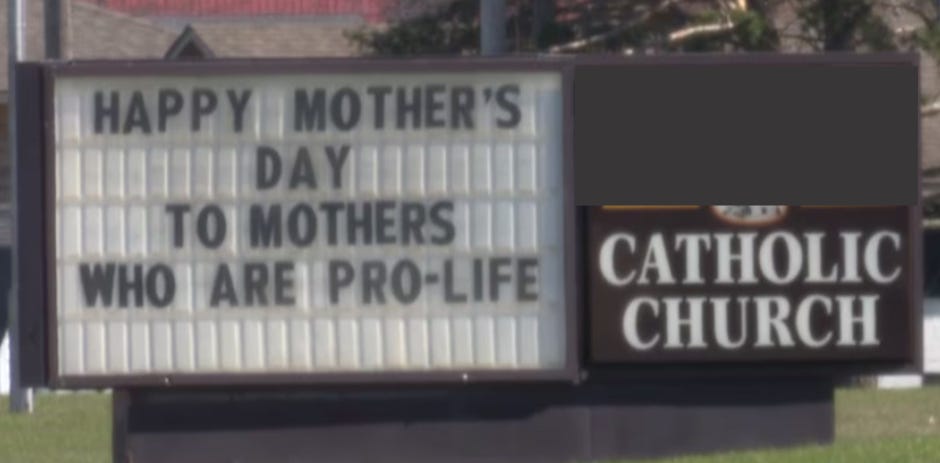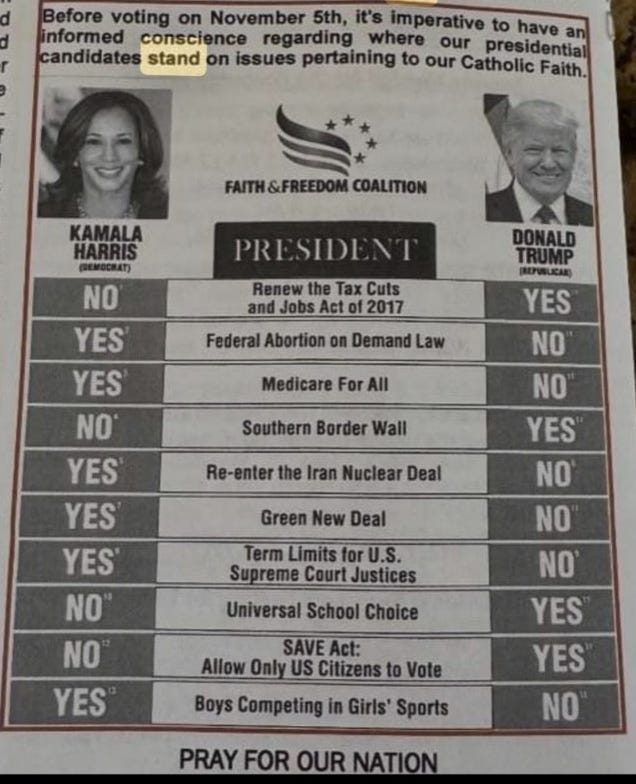I Lost My Parents to the Red Pulpit
A warning on why church and state must remain separate

Until recently, places of worship were barred from endorsing political candidates without risking their tax-exempt status. The rule was rarely enforced—but this past Monday, the IRS made it official: churches and clergy can now endorse candidates from the pulpit with no consequences.
While this may seem like a positive development to regular church-goers, it’s a slippery slope with serious consequences.
This new rule invites even more division. The Jesus I grew up learning about—the one who preached unity, compassion, and care for the vulnerable—would never want his church used this way.
I already know what it feels like to walk into a church, knowing exactly who the priest - and most of the congregation - want me to vote for.
During COVID, it was especially painful. A local priest refused to wear a mask and did not enforce the use of masks during mass.
The bishop told him that masks were required. He refused anyway. That decision didn’t just defy leadership—it modeled defiance to the entire congregation. And they followed. Including my own doctor.
This is the same priest who posted, “Happy Mother’s Day to mothers who are pro-life” on the church sign—and who used the parish bulletin to spread political misinformation comparing Donald Trump and Kamala Harris.
Image originally published by a regional news outlet in May 2022. View source.
And it wasn’t an isolated incident. Another local priest re-posted a video on his Facebook page stating that people who voted for Democrats would go to hell. This emboldened parishioners I thought were my friends to tell me this to my face.
Across parishes in my area, the message was loud and clear. Spiritual authority was used to abuse the platform of the Church to promote division, misinformation, and conditional belonging.
And - I promise you - this will only get worse if places of worship endorse political candidates with greater regularity than they already are.
Church bulletin excerpt (publicly shared, 2022).
Losing two grandparents to COVID within 4 months of each other was devastating. But even more painful in some ways was the way that people who said they followed Jesus and stood for love and caring for others refused to wear masks as a political statement. Including people I once considered friends.
Because of this, I walked into church and felt unwelcome. Unloved. Unseen. Outcast.
Although priests are put on a pedestal, they are fallible human beings, just like the rest of us.
They don’t deserve to be placed on that pedestal—because at some point, it starts to look a lot like idolatry.
This is a big problem in red, rural churches where I live. Critical thinking has been replaced with tribal loyalty. Parishioners huddle in their own groups, sharing the latest conspiracy theory like it’s gospel.
It would be easier for me to stay silent. I mourn people who are still alive every day. People who post scripture and their attendance at Bible studies on social media, but who either fully endorsed Trump or who are too cowardly to stand up for the cruelty caused by the current administration.
The deep red priests in my rural area stole my parents. My parents thought they were growing in faith. In reality, they were growing—apart—from their children.
So please excuse me if I am angry with the clergy in my area.
These are the clergy we’re supposed to trust for spiritual guidance—not political punditry.
They have caused nothing but grief and strife for me, and I mourn who my parents used to be. Because the longer this goes on, the less likely it feels they’ll ever come back.
While the late Pope Francis and Pope Leo have spoken out against the policies of Trump and Vance, a priest in my community posted on his Facebook that Vance’s mother did a wonderful job raising him.
These are the same clergy who preach that the Pope is chosen by God—then turn around and bash him for being “too liberal.”
But let’s be clear.
There’s a difference between thoughtful disagreement with the Pope and outright dismissing his authority because his message doesn’t align with American political ideology. Disagreement is part of Catholic tradition. But I’ve seen priests—and parishioners—reject Pope Francis and now Pope Leo not on theological grounds, but because they speak about things like climate change, poverty, or compassion toward immigrants. That’s not discernment. That’s partisanship wearing a collar.
Some might argue that the Pope himself speaks on political issues—immigration, poverty, climate change. And that’s true. But there’s a critical difference between a pastoral call to care for the vulnerable and using the pulpit to tell parishioners who to vote for. One is rooted in centuries of Catholic social teaching. The other is political coercion disguised as faith.
To be clear, I know there are priests and churches still doing the work of love, humility, and inclusion. But where I live, those voices are increasingly drowned out by political noise from the pulpit—and those loud voices have taken captive the people I love most. I know forgiveness is supposed to be a virtue. But I don’t know if I can forgive this.
Christian Nationalism is Not Christianity
The first clause in the Bill of Rights states: “Congress shall make no law respecting an establishment of religion.”
When church and state blur, faith becomes vulnerable to weaponization—especially in the form of white Christian Nationalism.
Entire books could be - and have been - written about white Christian Nationalism. But for now, here are a few essentials to keep in mind:
Christianity and white Christian Nationalism are not the same thing.
White Christian Nationalism is on the rise in the U.S., and some of its most visible champions have emerged from the Trump administration, including Pete Hegseth, Mike Johnson, and Pam Bondi.
White Christian Nationalism is what happens when the power of faith is twisted into a tool for dominance and control. It merges national identity with a narrow vision of Christianity, often ignoring the teachings of Jesus in favor of political power, racial hierarchy, and cultural dominance.
As Sojourners puts it so clearly:
If faith were not powerful, people in power would not invest so much to manipulate it for their own interests. When we oppose Christian nationalism, we must begin with a recognition of the power of faith.
Faith has the power to bring us together and build up a democracy where everyone can thrive. Every movement toward a more perfect union in our nation’s past has been powered and sustained by deep faith traditions. We need to learn from the faith of Frederick Douglass, Sojourner Truth, and William Lloyd Garrison; Martin Luther King Jr., Dorothy Day, and Ella Baker. This rich theological heritage helps us guard against the forces that distort Christianity to justify extremism. But it also prepares us to practice prophetic faith in our own lives and ministries.
Source: Sojourners, “How Christians Can Counter Christian Nationalism” (September/October 2024)
This is the kind of faith I want to reclaim. Not the kind used to shame, divide, or dominate—but the kind that uplifts, heals, and dares to speak truth to power.
The kind that understands power comes with faith, and wields that power the way Jesus would have.
We cannot let our churches become megaphones for politicians. Not when they were meant to be sanctuaries. Not when our faith was meant to be a refuge for the lost—not a tool for control. The pulpit should never be red, or blue.
I’ve experienced firsthand what it feels like to be an outcast in church. It doesn’t lead to healing—it leads to doubt. And sometimes, to walking away from the faith entirely.
The very people who lament that “no one goes to church anymore” are the same ones making it unbearable to stay. This especially includes clergy.
And to any clergy reading this: please recognize the power you hold, and use it accordingly. Peoples’ families and relationships are in your hands.
I don’t know if my parents will ever come back. But I do know this: if the church becomes a mouthpiece for political power, it ceases to be a sanctuary at all.
Sources:
Separation of Church and State – U.S. Constitution.net
How Christians Can Counter Christian Nationalism | Sojourners





I always loved going to church. Even as a little child, I loved it. The opportunity to thank a Higher Power for a good, healthy life, people who loved and cared for me. Then a message of caring for others, being kind, being generous. All basic humanity. But the last time I went, it was a political rally. I stayed after services and told the Priest: “If I want a political rally, I’ll go to one. Church is not the place for that”. His reply? “I’m sorry you feel that way”. As if I’m the problem for not wanting my faith to be politicized. I can only pray that one day the world will recover from this madness of hate, revenge, power and greed and become just basic good people, in service to one another, regardless of how we choose to worship, or love or vote.
Exceptional piece.